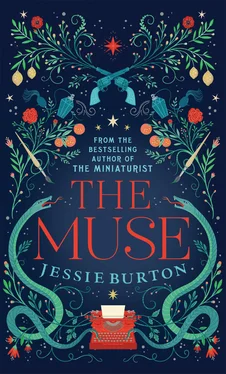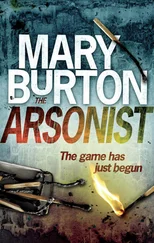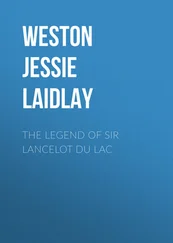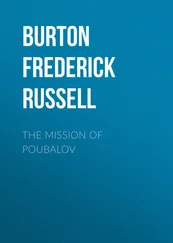‘Nothing bad is going to happen.’ Olive knelt down by Isaac’s side, her fists locked together in supplication, resting on his knee. ‘No one will ever know. Please, Isa. Please .’
He ran his hands nervously over his head. ‘What if Peggy Guggenheim wants to meet me?’
‘She’s not going to want to come down here.’
‘What if she invites me to Paris? She has already mentioned London.’
‘Then say no. Play the elusive artist.’
Isaac narrowed his eyes. ‘Now is not the time for English irony.’
‘No, I mean it. Isaac, please .’
‘What will you do for me?’
‘Anything you want.’
Isaac closed his eyes and drew his hand down his face again, as if he was washing away his thoughts. He lifted her from the floor and rose from the table, leading her across the kitchen towards his bedroom door. ‘One painting, Olive,’ he said. ‘And then — no more.’
Isaac demanded to see The Orchard before it was shipped to Harold’s office in Paris, ‘so at least I know what I am putting my name to.’ Teresa suggested that perhaps Sarah should view it too, because it would be useful for her to see Isaac with The Orchard . This would reinforce the general belief that the painting was his, should Sarah ever mention seeing it to her husband.
Olive was surprised at Teresa’s suggestion. ‘I suppose it’s a good idea,’ she said to her. ‘But I thought you didn’t want anything to do with this?’
Teresa merely shrugged.
‘Oh, it’s wonderful,’ said Sarah, standing in front of the painting that afternoon in the front east room. Olive scuttled away from it — rather like a crab, it seemed to Teresa — running from a great wave, unable to put her head out of her shell. Her confident attitude had evaporated, and she sat herself in her father’s armchair to watch her mother. Teresa took in the vision of Sarah’s red woollen trousers, the deep blood shade against her creamy skin; Sarah had clearly rallied herself. ‘It’s so like our orchard,’ she said. ‘But. . different.’
‘Thank you, señora,’ said Isaac, in visible discomfort.
‘Isn’t it good, Liv?’
‘Yes,’ said Olive, unable to meet Isaac’s eye.
Sarah insisted that Teresa fetch Isaac tea and polvorones . ‘We’re so glad to have Teresa,’ she said. ‘It would all be such a palaver without her. And I’m so proud of finding you, Mr Robles,’ she said to him, leaning against the back of the sofa where he was sitting. She was warm, conciliatory. ‘How does it feel, to be the toast of Paris?’ she asked.
‘What is toast ?’
‘It means you’re everyone’s new favourite. He’ll be champing at the bit when he sees this.’ She waved her hand in the direction of The Orchard . ‘Honestly, Mr Robles, I’m so glad I commissioned you in the first place, although it’s hard to share you. It’s just a shame my painting is hanging on another woman’s wall.’
‘Yes,’ he said.
‘Well,’ she sighed, and it sounded like twenty words in one. ‘My husband will be home soon.’ The marital noun made it sound as if Isaac would have no idea who Harold was.
‘It will be good to see him,’ said Isaac.
Sarah smiled and left the room, and Teresa felt as if the wattage of the day had dimmed as they listened to her moving back up the main staircase. Olive stepped quickly to the door and shut it. ‘Well, Isa?’ she asked, whirling round. ‘Do you like it?’
They all stared at the painting, the undulating patchwork of fields, the surreal intensity of colour, the white house which once was his to roam and now the home of someone else. ‘Does it matter whether I like it?’ he asked.
Olive looked uncomfortable. ‘You don’t like it.’
‘I can see its merit, but it is not what I myself would paint,’ he said.
‘He does not like it,’ said Teresa.
‘It is not that simple,’ Isaac snapped.
Olive stood before the painting. ‘I think it is that simple, really. What don’t you like about it?’
‘My God!’ he cried. ‘Why do I have to like it? Is it not bad enough I am pretending I have made it?’
‘Do keep your voice down,’ she said.
‘You have even painted my initials.’
‘A necessary touch.’
He stood up. ‘I hate it,’ he said, savagely. ‘I hope your father does too.’
‘Isaac—’
‘Good day, señoritas.’
Olive looked as if he had slapped her in the face. When he left the room, Olive ran to the window, watching his figure disappearing down the slope to the rusting gates. He pushed them open roughly, not looking back once.
‘Do not be upset,’ said Teresa, stepping forward. ‘What does it matter if he doesn’t like it?’
Olive made a sound of frustration. ‘He can hate what I create, but I can’t create if he’s angry with me. I just can’t.’
‘But why not? You painted before you knew him.’
Olive gestured at The Orchard . ‘Not like this, not like this!’ She pressed her forehead against the peeling wooden shutter. ‘And if he doesn’t like it, how can we be sure he’ll ship it to my father? It has to go soon. We’ll lose momentum with the Guggenheim woman.’
‘I am sure she will wait for genius.’
Olive wrinkled her nose. ‘That’s a word that gets bandied about too much. I’m not a genius. I just work hard.’
‘Well, she will wait. And if my brother will not do it, I can take it to the port myself.’
‘You?’
‘You can trust me.’
Olive kept her face hidden, still leaning her forehead on the shutter. ‘You broke my trust when you put that painting on the easel. I never know if you’re my friend or not.’
Teresa was silent for a moment. She couldn’t hide her pain. Sometimes Olive was as coquettish as her mother, for all her determination to be different. ‘You cannot see? You can trust me with your life.’
Olive lifted her head. ‘Never mind about my life, Tere. Do you mean it about the painting? You’ll take it to the port?’
‘Yes.’
Olive peered down the slope towards the gate, through which Isaac had long disappeared. ‘I’ve never had a true friend.’
‘Neither have I.’
‘Have you ever been in love? Have you ever been with a man?’
‘I have not.’
‘Been with a man — or been in love?’
‘Been with a man.’
Olive turned to her. ‘But you’ve been in love.’
Teresa felt her cheeks flame. ‘No. I do not think so. I do not know.’
That night, Teresa did not go back to the cottage. She was permitted to install herself in the corner of Olive’s attic, sorting the artist’s brushes and her clothes, a heady bliss that followed truce. Olive revealed that she had been painting a portrait of Isaac. It had been a long time coming, Teresa thought — given the speed with which the girl could usually work, the sketchbooks overflowing with the pencilled planes of his face.
Glancing over at Olive by the easel, Isaac’s features developing on the wood before her, Teresa could see it was an astonishing beginning. He had greenish skin, and a consumptive, claustrophobic look in his eye. But his head seemed on fire, sweeps of dandelion and canary yellows up to the top of the painting, where red flecks were being spattered like the wake of murderous thoughts. It was a livid rendering, and Olive looked to be as if in a trance. Teresa knew that the balance between her brother and this girl wasn’t right, but she doubted Olive was aware of these layers of infatuation and fear, manifesting by her very own hand.
Olive finished her first go at Isaac in the small hours. At three in the morning, exhausted, she lay back on her mattress, staring at the roof beams and flaking ceiling plaster, its rough raised corners illuminated by the weak glow from her bedside candle. A wolf howled, distant in the mountains.
Читать дальше












